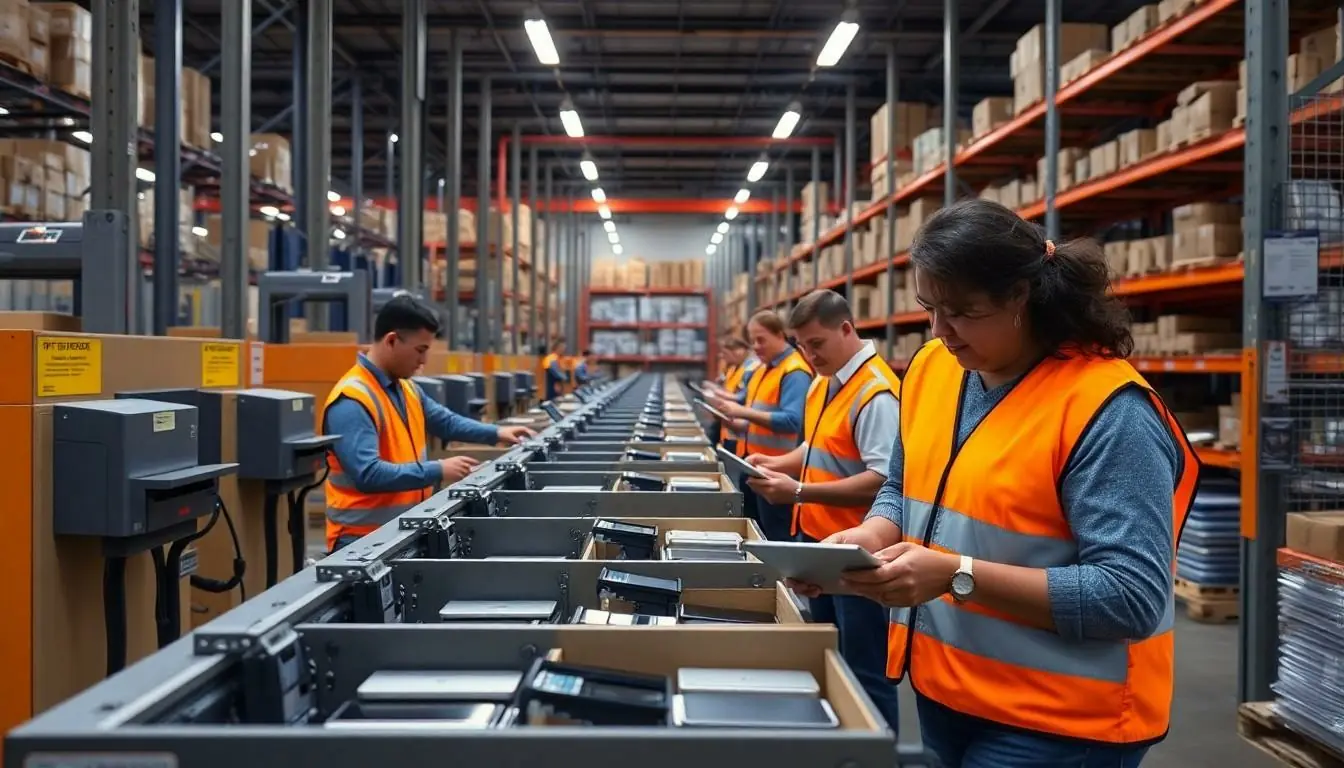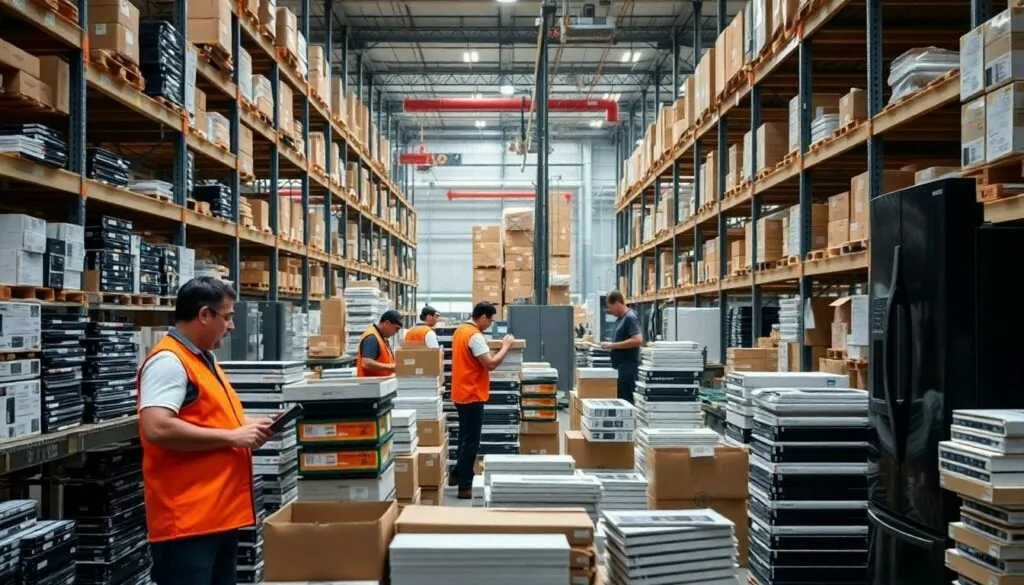Table of Contents
ToggleIn today’s tech-savvy world, consumer electronics are flying off the shelves faster than you can say “latest gadget.” But what happens after that shiny new device is sold? Enter the unsung heroes of the retail realm: consumer electronics fulfillment services. These behind-the-scenes wizards ensure that every smartphone, tablet, and smart fridge makes it to your doorstep without a hitch.
Overview of Consumer Electronics Fulfillment Services
Consumer electronics fulfillment services manage the efficient delivery of devices like smartphones, tablets, and smart fridges. These services handle every step, from inventory storage to shipping, ensuring products reach customers promptly.
Providers of fulfillment services offer solutions tailored to the specific needs of the electronics market. They maintain warehouses equipped with state-of-the-art technology for inventory management. Tracking systems monitor stock levels and provide real-time updates on product availability.
Shipping options vary significantly based on service providers. Next-day delivery remains a preferred choice for many consumers. Additionally, providers often include options like same-day delivery in urban areas, catering to instant gratification trends.
Customer service plays a vital role in fulfillment services. Having dedicated teams to manage inquiries enhances overall satisfaction. Responsive support helps resolve issues quickly, impacting brand loyalty positively.
Automation is increasingly prevalent in fulfillment centers. Automated systems improve picking, packing, and shipping processes. This technology reduces human error and streamlines operations, leading to cost savings.
Collaboration between electronics manufacturers and fulfillment service providers fosters efficiency. Manufacturers rely on these services to manage high volumes and seasonal surges in demand. Outsourcing fulfillment allows companies to focus on product innovation rather than logistics.
Finally, adapting to consumer trends significantly influences fulfillment strategies. Services now emphasize flexibility and scalability to address shifting market demands. These features position fulfillment providers as critical partners in achieving successful customer experiences.
Importance of Fulfillment Services in Consumer Electronics

Fulfillment services play a crucial role in the consumer electronics sector, ensuring timely delivery and maintaining high customer expectations. They address logistical challenges that arise in this fast-paced market.
Speed and Efficiency
Speed and efficiency define successful fulfillment services in consumer electronics. Quick order processing reduces lead times, with many providers offering next-day delivery as a standard option. Automation in fulfillment centers enhances efficiency by streamlining inventory management and order picking. Real-time stock tracking further contributes by minimizing delays, allowing companies to react swiftly to changing demands. Flexibility in shipping options accommodates varying customer needs, from express services to standard deliveries. Rapid response to order changes or issues maintains operational flow, ensuring that customers receive their devices promptly.
Customer Satisfaction
Customer satisfaction hinges on the effectiveness of fulfillment services. Efficient delivery not only meets expectations but enhances the purchasing experience. With dedicated customer service teams, fulfillment providers address inquiries and resolve issues swiftly, strengthening brand loyalty. Timely and accurate shipments foster trust, encouraging repeat purchases. Additionally, personalized communication regarding shipping updates keeps customers informed, further improving satisfaction. Adapting to customer feedback enables fulfillment services to continually refine processes, aligning with buyer preferences. Satisfaction translates into loyalty, making these services indispensable for electronics companies aiming for sustained success.
Key Features of Fulfillment Services
Fulfillment services in the consumer electronics sector encompass vital features that enhance operational efficiency. Key aspects include inventory management and order processing, both crucial for meeting customer expectations.
Inventory Management
Effective inventory management systems play a pivotal role in fulfilling consumer orders. Providers utilize advanced technology for optimal stock tracking, ensuring accurate real-time updates. Quality management processes minimize errors, which is important when dealing with electronic devices that demand careful handling. Integrating barcoding and RFID technology streamlines inventory checks and replenishments, catering to fluctuating demands. Responsive systems adjust to seasonal trends, allowing for increased stock in preparation for peak sales periods. Such agility enhances readiness for spikes in consumer interest while maintaining overall efficiency.
Order Processing
Order processing directly influences customer satisfaction and operational speed. Fulfillment services streamline this phase to ensure quick transitions from order receipt to shipment. Automation reduces manual tasks and expedites the packing process, leading to shorter delivery times. Each order receives meticulous attention, minimizing the risk of discrepancies that could affect customer trust. Additionally, providing multiple shipping options accommodates consumer preferences, whether for standard or expedited service, enhancing flexibility. Engaging staff in ongoing training maximizes productivity and ensures high standards during order fulfillment.
Challenges in Consumer Electronics Fulfillment
Consumer electronics fulfillment faces several challenges that impact overall efficiency and customer satisfaction.
Supply Chain Disruptions
Supply chain disruptions significantly affect the timely delivery of consumer electronics. Natural disasters and geopolitical issues can lead to delays in sourcing components. Similarly, a shortage of materials causes bottlenecks in production, making it difficult to meet consumer demand. Fulfillment providers often navigate these challenges by building resilient supply chains. They collaborate with multiple suppliers to maintain inventory levels and ensure quick recovery from disruptions. Advanced analytics tools help forecast potential interruptions and proactively address them. Manufacturers adapt by diversifying their logistics partners and utilizing alternative shipping routes.
Returns Management
Returns management presents another challenge in the consumer electronics market. A higher return rate occurs due to product defects, customer dissatisfaction, or incorrect orders. Managing these returns efficiently requires streamlined processes to minimize impact on fulfillment operations. Providers often implement automated systems to handle returns, which simplifies tracking and processing returned items. This approach enhances customer experience by making the return process more straightforward. Analytics further aids in identifying patterns in returns, allowing electronics companies to refine product quality and reduce future returns. Responsive communication also plays a crucial role, providing customers with clear return instructions and timely updates.
Future Trends in Fulfillment Services
Innovations in fulfillment services continue to evolve rapidly, impacting the consumer electronics sector significantly.
Technology Advancements
Automation and artificial intelligence shape the future of fulfillment services. Robotics streamline warehouse operations, enhancing picking and packing speeds. Real-time inventory tracking systems utilize IoT devices for accurate stock management and monitoring. Cloud-based platforms enable seamless integration between retailers and fulfillment providers, ensuring data accessibility and processing efficiency. Blockchain technology may enhance transparency in tracking shipments, providing verification throughout the delivery process. Advanced analytics tools analyze customer preferences to predict demand fluctuations, allowing providers to adjust inventory levels efficiently. Embracing these technologies creates opportunities for improved operational efficiency and customer satisfaction.
Sustainability Practices
Sustainability remains a priority in consumer electronics fulfillment services. Providers focus on eco-friendly packaging materials to minimize waste. Carbon-neutral shipping options attract environmentally conscious customers, demonstrating a commitment to sustainable practices. Energy-efficient warehouse operations reduce the overall carbon footprint of fulfillment centers. Sustainable sourcing practices aim to select suppliers who prioritize environmental responsibility. Providers increasingly adopt circular economy principles, enhancing recycling and refurbishment initiatives for electronic devices. Implementing these practices helps businesses align with consumer values and address the growing call for environmental stewardship in logistics.
Consumer electronics fulfillment services are vital in today’s fast-paced market. They not only streamline the delivery process but also enhance customer satisfaction through efficient inventory management and responsive support. As technology continues to evolve, these services adapt to meet changing consumer demands, ensuring timely deliveries and reducing errors.
The integration of automation and advanced analytics is reshaping the landscape, making fulfillment providers essential partners for electronics manufacturers. By addressing logistical challenges and focusing on sustainability, they help businesses thrive while aligning with consumer values. With the right fulfillment strategy, companies can enhance their operational efficiency and foster brand loyalty, positioning themselves for long-term success in the competitive electronics sector.






